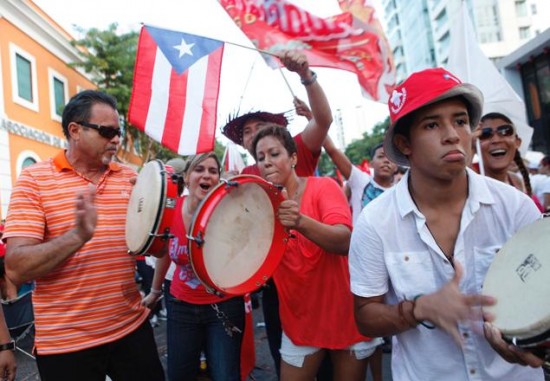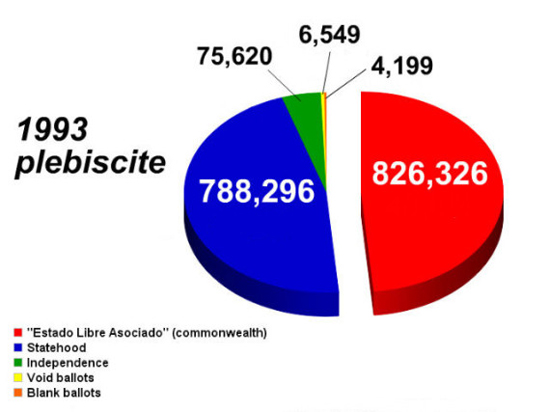61 percent said they would pick U.S. statehood if continuing as a self-governing commonwealth were off the table, even as they ousted pro-statehood Governor Luis Fortuno.
By Reuters | Published: Wednesday, November 7, 2012, 5:45 PM | Updated: Wednesday, November 7, 2012, 7:19 PM

Ana Martinez/Reuters
A supporter of the pro-statehood New Progressive Party holds the American flag after casting her vote to elect the local government and participate in the fourth political status plebiscite to decide among statehood, independence or sovereign state with association with the U.S. in San Juan, Tuesday.
SAN JUAN, Puerto Rico – Puerto Ricans showed support in a non-binding referendum to change the island’s status as a U.S. territory, preferring to become the 51st U.S. state even as they ousted their pro-statehood governor from office, according to official results on Wednesday. Puerto Ricans faced two questions in a status vote on Tuesday, with the first asking if Puerto Rico should keep its current status as a self-governing commonwealth. Nearly 54 percent of voters said no, while 46 percent chose to remain a commonwealth under which Puerto Ricans living on the island are U.S. citizens. They cannot vote for president, however, and are represented by a non-voting delegate in the U.S. House of Representatives.
The second question asked voters, regardless of their answer to the first question, to choose their preference among three non-territorial options – U.S. statehood, independence, or a sovereign free association with ties to the United States. Statehood gained 61 percent of the vote versus 33 percent for sovereign free association, under which terms of the relationship between a sovereign Puerto Rico and the United States would be detailed in a new pact. Independence received more than 5 percent support. But nearly one-third of the total votes cast left the answer to the second question blank and were not included in the vote tally. With those ballots counted, support for statehood was calculated to be closer to 45 percent, analysts said. The referendum was backed by Republican Governor Luis Fortuno of the New Progressive Party which supports statehood.
On Wednesday, he conceded defeat in Puerto Rico’s gubernatorial race after narrowly losing his re-election bid. Fortuno’s main rival was Senator Alejandro Garcia Padilla of the pro-commonwealth Popular Democratic Party, or PDP. “I accept the will of the people and congratulate Governor-elect Alejandro Garcia Padilla,” Fortuno said. With 96 percent of the voting stations reporting, Garcia Padilla had 47.85 percent and Fortuno had 47.04 percent, according to Puerto Rico’s State Elections Commission.
The governor’s race played out against pressing issues like a stagnant economy, stubborn unemployment of 13.6 percent and a high level of violent crime fueled by drug trafficking, with a record-breaking 1,117 murders being registered on the island last year. Ahead of the vote, Wall Street expressed concern a loss by Fortuno could upset a fiscal restoration plan he implemented that included government layoffs and other belt-tightening measures. Puerto Rico debt is widely held by U.S. investors because of its unusual full exemption from federal, state and local income taxes, and investors have credited the Fortuno administration with bringing government finances under control and implementing tax and energy reform.

Ana Martinez/Reuters
Followers of the Popular Democratic Party, who favor the island’s current political status, play ‘panderos’ in front of their party after casting their vote in San Juan, Tuesday.
However, Puerto Rico’s debt has ballooned to $67 billion, making it among the most indebted jurisdictions in the United States, and economic growth remains tepid, growing by 1.1 percent last year after six years of decline. Debate over the island’s status has long dominated politics in Puerto Rico where voters have opted to remain a U.S. commonwealth in four votes held since 1967, but the margin of victory has decreased over the years. Most Puerto Ricans pay no federal income tax, but contribute to Social Security and are eligible to receive federal welfare benefits, and many have served in the armed forces.
Commonwealth supporters describe Puerto Rico’s relationship with the United States as a bilateral pact that allows the island some autonomy, but critics say it is a colony under the complete authority of the U.S. Congress. Any change in Puerto Rico’s status would have to be approved by the Congress.
In 1998, the last time voters were asked to choose their status preference, just over 50 percent chose a “none of the above” option that was backed by the PDP. The party chose not to support a “commonwealth option” on the ballot because it was defined as a territorial status subject to congressional authority. The United States seized Puerto Rico as war booty from Spain following the Spanish-American war in 1898. The island was granted a larger degree of autonomous rule under commonwealth status in 1952.





